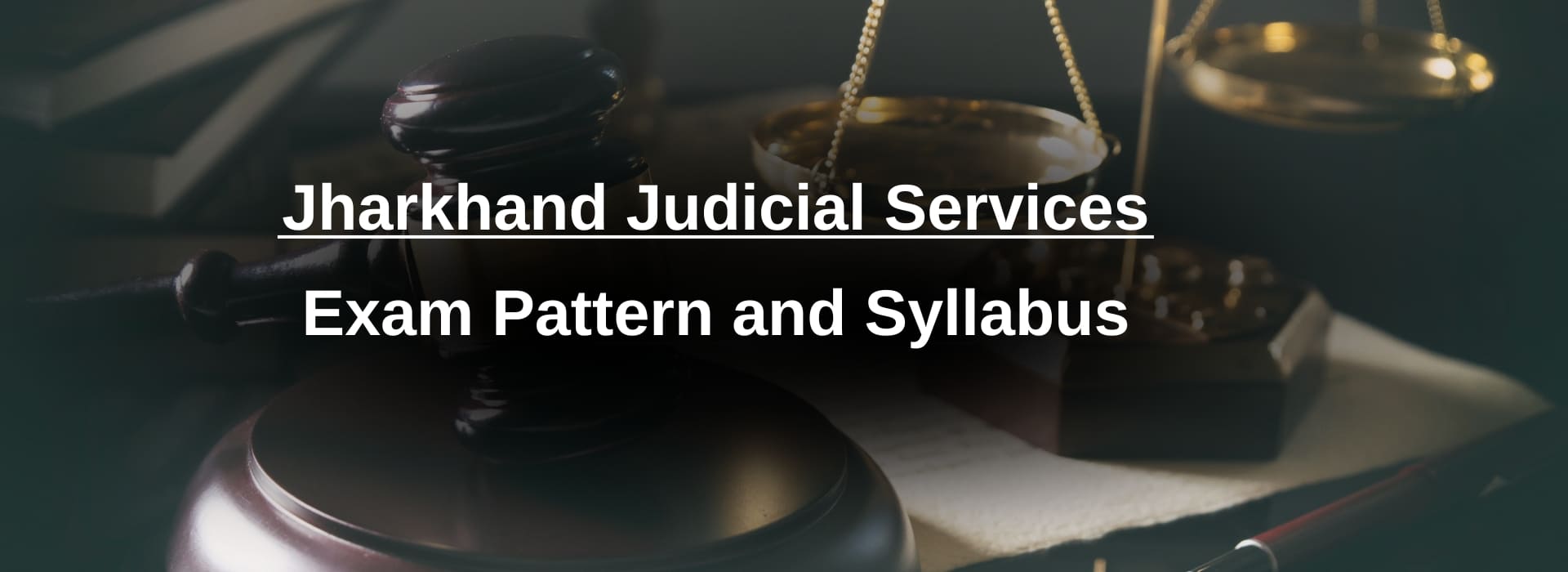
Jharkhand Judicial Services Exam Syllabus and Exam Pattern 2024
If you're aiming for a career in the judiciary and are preparing for the Jharkhand Judicial Services Exam 2024, it's crucial to have a clear understanding of the syllabus. Knowing exactly what to study will guide your preparation. We’re here to provide you with a detailed overview of the Jharkhand Judiciary syllabus. However, make sure to check the official notification and syllabus from the official website to stay up-to-date.
The Jharkhand Civil Judge Exam 2024 has three major stages: the Preliminary Exam, the Mains Exam, and the Interview.
In this article, we’ll cover:
- Jharkhand Judiciary Prelims Syllabus
- Mains Syllabus for Jharkhand Judiciary
- Jharkhand Judiciary Interview Syllabus
Jharkhand Judiciary Prelims Syllabus 2024
The first stage of the Jharkhand Judiciary exam is the Preliminary Exam, which is conducted by the Jharkhand Public Service Commission (JPSC). It is a Multiple Choice Question (MCQ) exam that is held offline.
Here are the subjects you’ll need to focus on for the Prelims:
- General English
- General Knowledge (including Current Affairs)
- The Code of Civil Procedure, 1908
- The Code of Criminal Procedure, 1973
- The Indian Evidence Act, 1872
- The Law of Contract, 1872
- The Indian Penal Code, 1860
The Preliminary Exam will carry a total of 100 marks. Keep in mind that these marks will not be included in the final selection process. Also, there is no negative marking in this exam.
Jharkhand Judiciary Mains Syllabus 2024
While preparing for the Jharkhand Judiciary Prelims, it's also important to start preparing for the Mains Exam. The Mains Exam is a written (subjective) exam and is essential for moving forward to the final stage, which is the Interview.
To help you in your preparation, make sure you regularly practice solving previous years’ JPSC Judiciary Question Papers to check your progress.
The Mains Exam consists of four papers, with each paper focusing on different aspects of law. Let’s look at the syllabus for each paper:
Paper I:
- Procedural Law (including The Code of Civil Procedure, 1908, and The Code of Criminal Procedure, 1973)
- The Indian Penal Code, 1860
- The Indian Evidence Act, 1872
- The Limitation Act, 1963
Paper II:
- The Contract Act of 1872
- The Sales of Goods Act of 1930
- The Negotiable Instruments Act of 1881
- The Arbitration and Conciliation Act, 1996
- The Transfer of Property Act, 1882
Paper III:
- The Hindu Law and Mohammedan Law
- Rent Control Law
- The Specific Relief Act of 1963
- Jurisprudence
Paper IV: Language
This paper assesses your proficiency in Hindi and English, with tasks such as:
- Essay Writing
- Precis Writing
- Translation & Paraphrasing
Jharkhand Judiciary Interview Syllabus 2024
The final stage of the Jharkhand Judiciary Exam is the Interview. This stage tests your personality, legal knowledge, and confidence. The Interview is worth 100 marks, and your final score will be based on both your Mains and Interview marks combined.
While the topics and areas tested can vary, the general focus of the Jharkhand Judiciary Interview includes:
- Legal Knowledge: Be prepared to answer questions about key legal concepts, statutes, case laws, and legal principles. This could include questions on the Indian Constitution, statutory interpretation, and legal precedents.
- Case Analysis: You might be given real or hypothetical legal cases to analyze, identify the issues, and propose solutions.
- Personal Qualities: Interviewers will assess your temperament, ability to stay calm under pressure, and your ability to deal with difficult situations.
- Communication Skills: Your ability to articulate legal reasoning and communicate clearly with court staff and lawyers will also be tested.
- Legal Precedents: Be ready to discuss your views on following established legal principles and the importance of legal precedents.
- Current Legal Issues: You may be asked about recent legal developments and your views on current societal or legal issues.
Conclusion
The Jharkhand Judicial Services Exam (JJS) offers an excellent opportunity to serve as a Civil Judge (Junior Division) in the state. To succeed in this highly competitive exam, candidates must follow a structured study plan, master the syllabus, and practice rigorously. By staying disciplined, focused, and committed to your goal, you can achieve success in this prestigious exam.
Good luck with your preparation for the Jharkhand Judicial Services Exam, and remember, perseverance is the key to success!